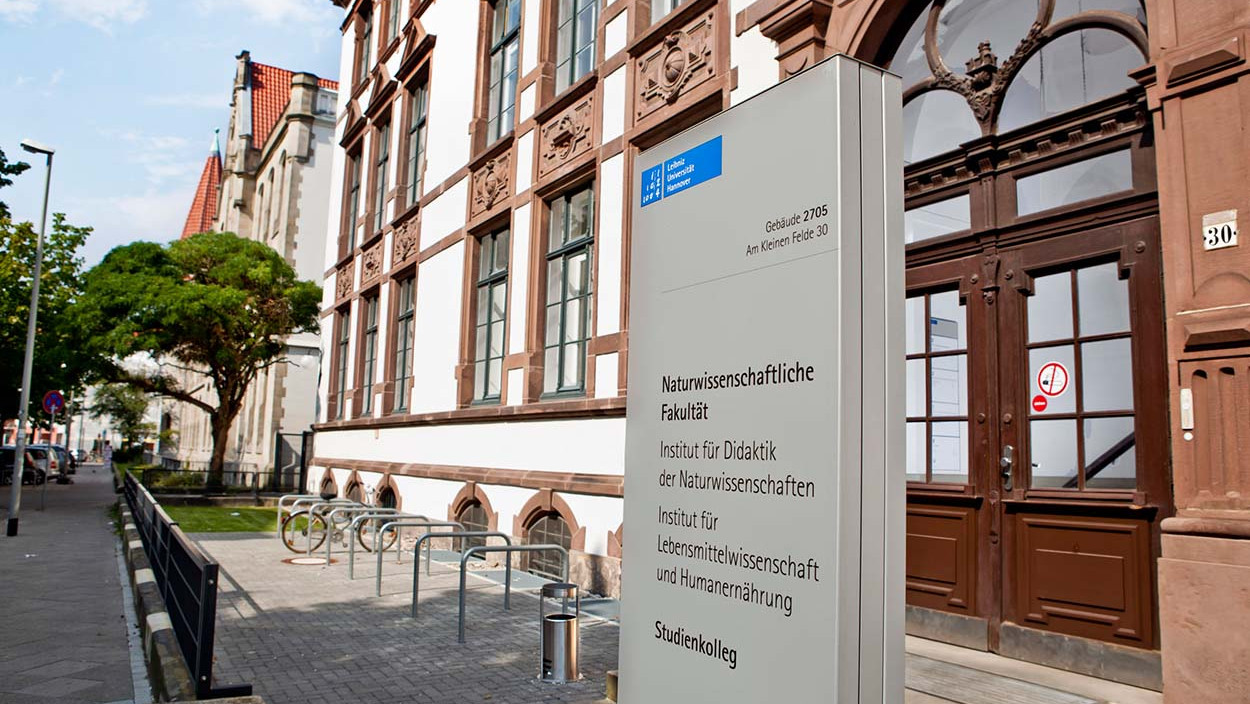Food Science as subject in the Bachelor’s Teacher Training Course for Technical Education
(Bachelor of Science)
Profile
German HZB: none
International application: German C1
Find out more
Pre-internship (recommended)
Stay abroad possible, but not obligatory.
Short Description
Food Science is offered as a vocational subject within the bachelor's programme Technical Education. In addition, a second teaching subject must be studied. Please note the subject combination options.
The degree programme in Food Science, which is subject to restricted admission, covers the scientific, technological, legal, economic, microbiological and hygienic aspects of food production in the commercial and industrial sector. The Bachelor’s degree programme also focuses on human nutrition, food chemistry, nutrition physiology and anatomy.
The aim of the programme is to prepare students for a teaching profession at vocational schools, technical colleges and vocational grammar schools, and for teaching specialist subjects for the following skilled trades: hotel specialist, restaurant specialist, butcher, baker, confectioner, chef, specialist salesperson or chain catering specialist. Graduates who go on to complete the subsequent Master’s “Teacher Training Course for Technical Education” may embark on a teacher training period.
Course Content
- Anatomy, human nutrition and biochemistry
- Chemistry for food science
- Economic and legal foundations of business management
- Food law and consumer law
- Food microbiology and food hygiene
- Food technology and sensory properties of food
- Marketing
- Mathematics and physics
- Nutrition physiology and human nutrition
- Production and product technology of plant and animal-based foods
The Bachelor’s degree programme in Technical Education: subject area Food Science is divided into three areas: the vocational subject area Food Science, the teaching subject, and Vocational and Business Education. These three areas are studied in parallel from the first to the sixth semesters. In addition, students also select elements from the area of key transferable skills to suit their interests, and complete practical training.
Students choose one of the following teaching subjects: Chemistry, German, English, Protestant Religious Education, Catholic Religious Education, Mathematics, Physics, Politics, Spanish or Physical Education. Instead of selecting a teaching subject, students may also choose Social Education & Community Work / Special Needs Education in Vocational Education.
The course of study is designed to comprise a Bachelor’s degree programme lasting six semesters followed by a Master’s degree programme that takes four semesters.
| Semester | 1 | 2 | 3 | 4 | 5 | 6 |
|---|---|---|---|---|---|---|
Compulsory modules | Mathematics Physics Legal Foundations of Business Management for Food Science Introduction to Business Administration for Food Science General, Inorganic and Organic Chemistry | Forms and Institutions of Basic and Advanced Training in the Occupational Area Aspects concerning the Teaching of Content Tailored to Target Groups Food Law and Consumer Law Food Microbiology Lab Course | Anatomy, Physiology and Human Biology Food Chemistry 1 Food Technology Food Hygiene | Functional Biochemistry Food Chemistry 2 Sensory Properties of Food | Nutrition Physiology Applied Human Nutrition Plant-Based Foods
Animal-Based Foods | Foundations Field trip and exercise classes |
Optional modules |
|
| Special Aspects of Food Quality – Functional Food Ingredients Methods of Experimental Nutrition Research | Testing Procedures for the Sensory Properties of Specific Food Groups Methods of Experimental Food Microbiology and Food Hygiene Applied Teaching Methodology in the Food Industry |
|
|
An interest and a sound knowledge of science (e.g. chemistry) are the prerequisites for completing the degree programme. Students should also enjoy and have an interest in working with young adults, and should have good communication and social skills. Students without a relevant vocational qualification must complete 52 weeks of practical training before registering their Master’s thesis.
- Students who pass the Bachelor’s degree may embark on a Master’s degree programme in order to then work as vocational school teachers.
- Alternatively, graduates may decide to embark on a Master’s degree programme in a scientific discipline with a view to working in the industrial sector.
- After completing the Bachelor’s degree after six semesters, graduates are also qualified to pursue a profession in the area of vocational basic and advanced training or to take on tasks in the food processing industry.
- Food Science as subject in the Master’s Teacher Training Course for Technical Education (Master of Education)
- Master’s Teacher Training Course for Technical Education (Master of Education)
Under certain conditions, admission to the following Master''s programme is also possible. More detailed information can be found in the respective admission regulations. If you have any questions, please contact the course advice of the desired Master''s programme:
Admission Requirements
Some subjects in the Bachelor Teacher Training Course for Technical Education are restricted: Computer Science, English Studies (school subject: English), Food Science, German Studies (school subject: German), Politics and Sports.
Some subjects in the Bachelor Teacher Training Course for Technical Education are admission-free: Catholic Religious Education, Chemistry, Colour Technology and Interior Decoration, Electrical Engineering, Mathematics, Metals Technology, Physics, Plant Operations and Manufacturing of Wood Products, Protestant Religious Education, Spanish Studies and Site Engineering.
The exact admission requirements can be found in the admission regulations:
Application Deadlines
01.06.-15.07. of the year for the winter semester
- First-year students (application for the 1st semester) can only apply for the winter semester.
- Those continuing their studies (application for higher semesters) can also apply for the summer semester (December 1st - January 15th.
The following applies to applications from non-EU countries:
- VPD from uni-assist OR a passed assessment test (Feststellungsprüfung) of a preparatory foundation course (Studienkolleg) is required.
- Applications for the Studienkolleg must be submitted by July 15th.
Do you have questions about studying? We are happy to help!

30167 Hannover

30167 Hannover









